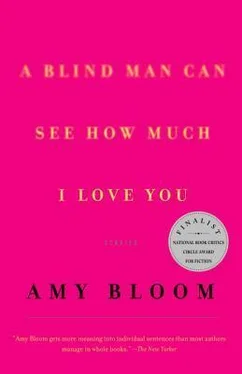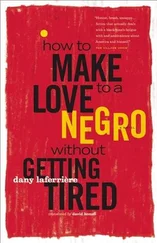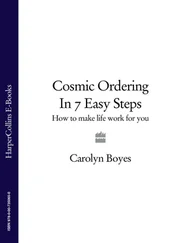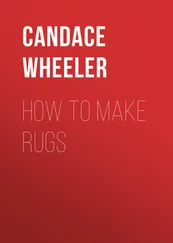“Morris Udall, respected congressional leader for thirty years, lies in this room, immobile. His daughter visits him every day although he is unable to respond—”
This is endless heartbreak. I don’t even feel sorry for Mo Udall, God rest his soul, he should just die already. There is no reason for us to listen to this misery. I want to plunge my tongue down Jack’s throat, pull gently on his chest hairs and do everything he likes, knot my legs tight around his waist and open myself up to him so wide that he falls into me and leaves this world forever.
We look at each other while the radio man drones on about poor Mo Udall, his poor family, all his accomplishments mocked and made dust (which is not the reporter’s point, presumably) by this pathetic and terrible disease. Jack looks away and smiles in embarrassment. He listens to this stuff all the time, it plays in his head when there is no radio on at all; he’s only sorry that I have to listen too.
It’s better to cook with him and say nothing, which is what I do. I want to hold him and protect him; I want to believe in the possibility of protection. Growing up in the Hoffmann family of miraculous escapes and staggering surprises (who knew Himmler had a soft spot for my grandfather’s tapestries, who knew the Germans would suddenly want to do business and keep their promises), I understood that the family luck had been used up. I could do well in life, if not brilliantly, and if my reach did not exceed my grasp, I would be all right. My grasp included good grades, some success as a moderately good painter, and lovers of whom I need not be ashamed in public.
We abuse, we betray, we are cruel.
We destroy, we embitter, we falsify.
We gossip, we hate, we insult.
We jeer, we kill, we lie.
One can recite the Ashamnu for hours, beat one’s breast in not unpleasant contemplation of all one’s minor and major sins, wrapped in the willing embrace of a community which, if it does very little for you all the rest of the year, is required, as family is, to acknowledge that you belong to them, that your sins are not noticeably worse than theirs, that you are all, perverts, zealots, gossips, and thieves, in this together.
“A girl from one of the art galleries wished me Happy Yom Kippur,” I said to Jack.
“Hell, yes. A whole new Hallmark line: Happy Day of Atonement. Thinking of You on This Day of Awe. Wishing You the Best of Barkhu.”
We had all risen and sat endlessly through this second holiday, and my own silent prayers got shorter and shorter as a few alter kockers and two unbearably pious young men lengthened theirs, making it clear that their communications with God were so serious and so transporting they had hardly noticed that the other three hundred people had sat down and were waiting to get on with it. When the faintly jazzy notes of the shofar had been sounded the correct number of times, I had the pleasure of hearing last year’s president say Jack’s name. John Malone. Not Jack. In the shul “Jack” sounded too sharply Christian, so clearly not part of us. Jack Jack Jack, I thought, and I would have shot my hand up to volunteer to rebuild the back steps with him, but I myself always questioned the motives of women volunteering to help on manual labor projects with good-looking men. I didn’t think badly of them, I just couldn’t believe they had so little to do at home, or at the office, that the sheer pleasure of working with cheap tools on a Sunday afternoon was what got them helping out my darling Jack or Henry Sternstein, the best-looking Jewish man, with dimples and beagle eyes and, according to Naomi’s good friend Stephanie Tabnick, a chocolate-brown beauty mark on his right buttock, shaped very much like a Volkswagen.
Open for us the gates, even as they are closing.
The day is waning, the sun is low.
The hour is late, a year has slipped away.
Let us enter the gates at last.
Jennifer, their daughter, came into the kitchen to nibble. I smiled and put a dozen hot kugel tarts, dense rounds of potato and salt and oil, to drain on a paper towel near her. Jack was fond, and blind, with Jennifer. She was tall and would be lovely, smart, and soft-hearted, and I think that he could not stand to know her any other way, to have her suffer not only his life but hers. When Jennifer succeeded in the boy venues, Naomi admired her extravagantly and put humiliating tidbits in the synagogue newsletter about Jennifer’s near miss with the Westinghouse Prize or her stratospheric PSATs; when Jennifer failed as a girl, Naomi narrowed her eyes venomously. Fiddling with her bra strap, eating too many cookies, Jennifer tormented Naomi, without meaning to. Jennifer sweated through her skimpy, badly chosen rayon jumpers, built to show off lithe, tennis-playing fourteen-year-olds, not to flatter a solid young woman who looked as if in a previous world she would have been married by spring and pregnant by summer. And Naomi watched her and pinched her and hissed at her, fear and shame across her heavy, worried face.
I love Jennifer’s affection for me; that it is fueled by her sensible dislike of her mother makes it better, but that isn’t the heart of it. The person Jennifer and Jack love is the best person I have ever been. My mother’s daughter is caustic and cautious and furiously polite; my lover’s lover is adaptable, imaginative, and impenetrably cheerful. Jennifer, I said to her at her bat mitzvah, surrounded by Sapirstein cousins, all with prime-time haircuts, wearing thin-strapped slip dresses that fluttered prettily around their narrow thighs while Jennifer’s clung damply to her full back and puckered around the waistband of her pantyhose, Jennifer, your Hebrew was gorgeous, your speech was witty, and you are a really, really interesting young woman. She watched her second cousin toss long, shiny red hair and sighed. Jennifer, I said, and when I pressed my hand to her arm, she shivered and I thought, Does no one touch you? Jennifer, I know I don’t know you very well, but believe me, they will have peaked in three years and you will be sexy and good-looking and a pleasure to talk to forever. She blushed, that deep, mottled raspberry stain fair-skinned girls show, and I left her alone.
Now, when I dropped by as a helpful friend of the family, she brought me small gifts of herself and her attention, and I even passed up some deep kisses with Jack in the garage, “getting firewood,” to give enough, and get enough, with Jennifer.
Jack put one hand on Jennifer’s brown curls and reached for a piece of kugel. I looked at him, and Jennifer laughed.
“Oh my God, that’s just like my mother. Daddy, wasn’t that just like Ima? I swear, just like her.”
Jack and I smiled.
“You know, about what Daddy eats. She read that he should eat a lot of raw vegetables and not a lot of fat. Like no more quesadillas. Like no more of these amazing cookies. You are now in Fat-Free Country, folks, leave your taste buds at the door.” She grabbed four chocolate lace cookies and went out to the backyard.
I had read the same article about alternative treatments, in Newsweek, and I dropped ginkgo powder into Jack’s coffee when I couldn’t steer him completely away from caffeine, and sometimes, instead of making love, I would say, I would chirp, “Let’s go for a swim! Let’s do some yoga!” and Jack would look at me and shake his head.
“I already have a wife, sweetheart. Andrea, light of my life. Darling Mistress. I don’t need another one.”
“You should listen to Naomi.”
“All mankind, all humankind, should listen to Naomi. I do listen, and I take good care of myself. It’s not a cold, D.M.”
I wanted it to be a cold, or even something worse, something for which you might have to have unpleasant treatments with disturbing, disfiguring side effects before you got better, or something that would leave scars like train tracks or leave you with one leg shorter than the other or even leave you in a wheelchair. Treatments that would leave you you, just the worse for wear.
Читать дальше












